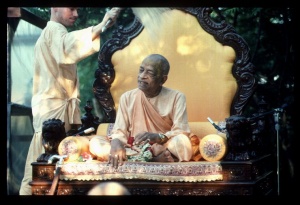CC Antya 19.49 (1975): Difference between revisions
(Vanibot #0027: CCMirror - Mirror CC's 1996 edition to form a basis for 1975) |
(Vanibot #0020: VersionCompareLinker - added a link to the Version Compare feature) |
||
| Line 2: | Line 2: | ||
<div style="float:left">'''[[Sri Caitanya-caritamrta (1975)|Śrī Caitanya-caritāmṛta (1975)]] - [[CC Antya (1975)|Antya-līlā]] - [[CC Antya 19 (1975)|Chapter 19: The Inconceivable Behavior of Lord Śrī Caitanya Mahāprabhu]]'''</div> | <div style="float:left">'''[[Sri Caitanya-caritamrta (1975)|Śrī Caitanya-caritāmṛta (1975)]] - [[CC Antya (1975)|Antya-līlā]] - [[CC Antya 19 (1975)|Chapter 19: The Inconceivable Behavior of Lord Śrī Caitanya Mahāprabhu]]'''</div> | ||
<div style="float:right">[[File:Go-previous.png|link=CC Antya 19.48 (1975)|Antya-līlā 19.48]] '''[[CC Antya 19.48 (1975)|Antya-līlā 19.48]] - [[CC Antya 19.50 (1975)|Antya-līlā 19.50]]''' [[File:Go-next.png|link=CC Antya 19.50 (1975)|Antya-līlā 19.50]]</div> | <div style="float:right">[[File:Go-previous.png|link=CC Antya 19.48 (1975)|Antya-līlā 19.48]] '''[[CC Antya 19.48 (1975)|Antya-līlā 19.48]] - [[CC Antya 19.50 (1975)|Antya-līlā 19.50]]''' [[File:Go-next.png|link=CC Antya 19.50 (1975)|Antya-līlā 19.50]]</div> | ||
{{CompareVersions|CC|Antya 19.49|CC 1975|CC 1996}} | |||
{{RandomImage}} | {{RandomImage}} | ||
==== TEXT 49 ==== | ==== TEXT 49 ==== | ||
<div class="verse"> | <div class="verse"> | ||
: | :akrūra kare tomāra doṣa, āmāya kene kara roṣa', | ||
:ihā yadi kaha | :ihā yadi kaha 'durācāra' | ||
:tui akrūra-mūrti | :tui akrūra-mūrti dhari', kṛṣṇa nili curi kari', | ||
:anyera nahe aiche vyavahāra | :anyera nahe aiche vyavahāra | ||
</div> | </div> | ||
| Line 20: | Line 19: | ||
<div class="synonyms"> | <div class="synonyms"> | ||
akrūra—Akrūra; kare—does; tomāra doṣa—fault to | akrūra—Akrūra; kare—does; tomāra doṣa—fault to you; āmāya—unto me; kene—why; kara—you do; roṣa—anger; ihā—this; yadi—if; kaha—you say; durācāra—O misbehaved (Providence); tui—you; akrūra-mūrti dhari'-taking the form of Akrūra; kṛṣṇa—Lord Kṛṣṇa; nili—you have taken; curi kari'-stealing; anyera—of others; nahe—there is not; aiche—this type of; vyavahāra—behavior. | ||
</div> | </div> | ||
| Line 27: | Line 26: | ||
<div class="translation"> | <div class="translation"> | ||
"O misbehaved Providence! If you reply to us, 'Akrūra is actually at fault; why are you angry with me?' then I say to you, 'Providence, you have taken the form of Akrūra and have stolen Kṛṣṇa away. No one else would behave like this.' | |||
</div> | </div> | ||
Latest revision as of 23:53, 26 January 2020
Śrī Caitanya-caritāmṛta (1975) - Antya-līlā - Chapter 19: The Inconceivable Behavior of Lord Śrī Caitanya Mahāprabhu

His Divine Grace
A.C. Bhaktivedanta Swami Prabhupada
A.C. Bhaktivedanta Swami Prabhupada
TEXT 49
- akrūra kare tomāra doṣa, āmāya kene kara roṣa',
- ihā yadi kaha 'durācāra'
- tui akrūra-mūrti dhari', kṛṣṇa nili curi kari',
- anyera nahe aiche vyavahāra
SYNONYMS
akrūra—Akrūra; kare—does; tomāra doṣa—fault to you; āmāya—unto me; kene—why; kara—you do; roṣa—anger; ihā—this; yadi—if; kaha—you say; durācāra—O misbehaved (Providence); tui—you; akrūra-mūrti dhari'-taking the form of Akrūra; kṛṣṇa—Lord Kṛṣṇa; nili—you have taken; curi kari'-stealing; anyera—of others; nahe—there is not; aiche—this type of; vyavahāra—behavior.
TRANSLATION
"O misbehaved Providence! If you reply to us, 'Akrūra is actually at fault; why are you angry with me?' then I say to you, 'Providence, you have taken the form of Akrūra and have stolen Kṛṣṇa away. No one else would behave like this.'